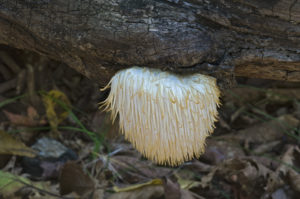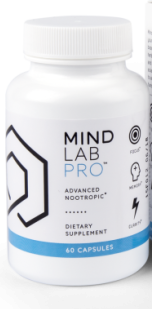Table of Contents
Lion’s Mane (Hericium erinaceus) is unique in the mushroom family both in appearance and function. Lion’s Mane Mushroom is extremely effective at stimulating Nerve Growth Factor (NGF) in the brain.
Known for its powerful effects as a “brain tonic”, Lion’s Mane is said to have been used as a tea for thousands of years by Buddhist monks. To enhance brain power, and heighten their ability to focus during meditation.
Lion’s Mane as a nootropic, is a powerful catalyst for brain cell regeneration helping improve memory and cognition.
The primary active compounds in Lion’s Mane are hericenones and erinacines. Erinacines help your brain produce more Nerve Growth Factor. Erinacines easily cross the blood-brain barrier to boost the production of neurons.
Lion’s Mane helps:
- Nerve Growth Factor. Lion’s Mane Mushroom prevents and treats nerve damage in the brain. Once past the blood-brain barrier, Lion’s Mane stimulates enzyme production that release Nerve Growth Factor (NGF). Nerve regeneration helps relieve neurodegenerative disease symptoms such as Alzheimer’s, dementia, and Parkinson’s Disease.
- Neurogenesis. Lion’s Mane stimulates the repair and creation of neurons. Boosting neurotransmitters and signaling that effects memory, learning, recall, and mood.
- Brain Optimization. Lion’s Mane helps eliminate brain fog. Restoring memory and mental alertness. And improves anxiety and depression symptoms.
Overview
Lion’s Mane (Hericium erinaceus) is a medicinal mushroom proven to benefit the brain, nerves and immune system.
Unlike other mushrooms sporting a cap and stem, Lion’s Mane has long, flowing, white tendrils. Resembling a lion’s mane. Other names include Monkey’s Head, Bearded Tooth, Pom Pom Blanc, Hedgehog Mushroom and Satyr’s Beard.

This parasitic fungus grows hanging off logs and trees. And is native to North American, Europe and Southeast Asia. In Japan, it’s called yamabushitake or “those who sleep in mountains”. Referring to the Shugendo sect of hermit monks and their long, flowing robes.
As a nootropic, Lion’s Mane has been shown to be particularly effective in stimulating Nerve Growth Factor (NGF) in the brain.
NGF is produced in the hippocampus throughout life. Modulating cholinergic receptors and neuroplasticity.[i] And is essential for learning.
Nerve Growth Factor are special proteins that function to regenerate neurons. Lion’s Mane contains two unique classes of NGF’s – hericenones and erinacines which easily cross the blood-brain barrier.
Lion’s Mane, like other medicinal mushrooms, contain high amounts of the antioxidant beta-glucoxylan and four other polysaccharides and polypeptides. Having a significant impact on enhancing your immune system. And decreasing tumor growth.
Lion’s Mane has also been studied in reducing amyloid plaques. These clumps of beta-amyloid proteins block signals between neurons. And are implicated in Alzheimer’s and other neurodegenerative diseases.
Lions’ Mane is also used to treat Lyme’s Disease, and digestive tract issues.
Here we’re talking about Lion’s Mane Mushroom and its effects on brain health and chemistry.
How does Lion’s Mane Work in the Brain?
Lion’s Mane boosts brain health and function in several ways. But two in particular stand out.
- Lion’s Mane Mushroom stimulates the synthesis of Nerve Growth Factor (NGF). NGF is a protein that plays a major role in the maintenance, survival and regeneration of neurons.
NGF is required by your brain to keep neurons strong and healthy. When various neurological disorders occur, your brain is unable to produce its own internal source of NGF.
In a study done in Kuala Lumpur in 2013, scientists showed that Lion’s Mane extract induced NGF synthesis and promoted neurite outgrowth.[ii]
- Lion’s Mane is effective in reducing anxiety and depression. Some even call it the “smart mushroom” for its ability to improve cognition, memory and work as an anti-depressant.
A study by researchers in Japan worked with 30 women. The female subjects had been complaining about menopause, depression, sleep quality and other issues.
The women randomly received Lion’s Mane-laced cookies or a placebo for 4 weeks. The researchers found that Lion’s Mane “has the possibility to reduce depression and anxiety, and these results suggest a different mechanism from NGF-enhancing action of H. erinaceus”. [iii]
How things go bad
Science once believed that the brain could not grow new brain cells. That once our brain developed during childhood, and we reached adulthood, we had all the brain cells we’d ever have.
Now we know that neurons can regenerate. But that doesn’t mean they will regenerate. A number of health issues can contribute to neurodegeneration.
↓ Decrease in Nerve Growth Factor = Decrease in Long-Term Potentiation affecting long-term memory[iv]
↓ Brain cells die and are not replaced
↓ Neuroplasticity declines resulting in poor memory
↓ Neurotransmitters decline resulting in anxiety, poor mood and depression
All of these age-related changes are contributing factors to neurodegenerative diseases like Alzheimer’s, Parkinson’s and others. And anxiety, depression and mood disorders that affect quality of life.
Lion’s Mane benefits
At least a dozen peer-reviewed studies have been published on Lion’s Mane benefits to brain health since 1991. Dr. Kawagishi of Japan was first to identify Nerve Growth Factor properties in Lion’s Mane Mushroom.[v]
In one double-blind, placebo-controlled trial, researchers in Japan worked with 50 – 80 year old men and women. All suffered from mild cognitive impairment.
The trial subjects received four 250 mg tablets containing 96% of Yamabushitake (Lion’s Mane) dry powder three times a day for 16 weeks. The men and women were tested at 4, 8, 12 and 16 weeks.
At each of the testing periods, the subjects who had used Lion’s Mane showed a significant improvement in cognitive scores. And their scores were increasing while on Lion’s Mane supplementation. But 4 weeks after stopping Lion’s mane supplementation, their cognitive scores decreased significantly.
The researchers concluded that Lion’s Mane Mushroom is effective in improving mild cognitive impairment.[vi]
How does Lion’s Mane feel?
You may not experience the effects of supplementing with Lion’s Mane Mushroom immediately. But many users report with continued use of Lion’s Mane, a boost in mood and mental energy.
 Some report it increases depth perception. And an improvement in sense of smell.
Some report it increases depth perception. And an improvement in sense of smell.
Others testify to improved decision-making, the ability to solve problems and learning. Likely due to Lion’s Mane ability to improve neuroplasticity.
The overall consensus is Lion’s Mane Mushroom’s ability to lessen anxiety, reduce depression, and improve concentration.
Lion’s Mane Clinical Research
Lion’s Mane Mushroom has been used as a food and herbal medicine since ancient times in East Asia. And it has been reported in scientific research that Lion’s Mane promotes Nerve Growth Factor both in the petri dish as well as in animal and human test subjects.
Lion’s Mane Prevents Cognitive Dysfunction
In this study, researchers examined the effects of Lion’s Mane on amyloid β(25-35) peptide-induced learning and memory deficits in mice. Amyloid β(25-35) peptide is implicated in diseases like Alzheimer’s.
Mice were injected with the peptide on days 7 and 14 of the trial. And they were fed a diet containing Lion’s Mane over 23-days of the experiment. The results showed that Lion’s Mane prevented short-term and visual recognition memory reduction normally induced by amyloid β(25-35) peptide.
They concluded that Lion’s Mane Mushroom “may be useful in the prevention of cognitive dysfunction”.[vii]
Lion’s Mane Induces Nerve Growth Factor
In this trial, mice were fed Lion’s Mane 5% freeze-dried powdered extract for 7 days. Researchers found an increase in the level of Nerve Growth Factor (NGF) in the hippocampus of the mice. Concluding that Lion’s Mane “contains active compounds that stimulate NGF synthesis”.[viii]
Lion’s Mane Repairs Nerves
In this study done with rats, Lion’s Mane extract was able to promote neuron regrowth after injury. Rats with gluteal nerve damage were able to walk again after consuming water containing Lion’s Mane extract.
The researchers concluded that Lion’s Mane regenerates damaged nerve cells. In this case, the reversal was so profound, the rats went from being totally disabled to walking again.[ix]
Lion’s Mane Dosage
Wondering how much Lion’s Mane to take? Dosing of Lion’s Mane Mushroom depends on the strength of the extract.
For Lion’s Mane 10:1 extract (30% polysaccharide), daily dosage is 500 – 1,000 mg taken 1 to 3 times per day. This means that if you choose a daily dose of 1,000 mg of Lion’s Mane extract, you should take 500 mg in the morning, and another 500 mg at noon.
Other retail extract dosage of Lion’s Mane ranges from 300 mg to 3000 mg dosed 1 – 3 times per day. Check the label and see what the manufacturer recommends. And when first using the supplement, start with the lowest dose and see how your body reacts.
Lion’s Mane Side Effects
Lion’s Mane Mushroom is non-toxic and considered very safe. So there are very few side effects reported.
Some neurohackers report itchy skin from higher doses. Likely attributable to a boost in Nerve Growth Factor.
Lion’s Mane has been tested in animals showing no side effects or toxicity even up to 5 grams per kilogram.
Best type of Lion’s Mane to buy
Lion’s Mane Mushroom (Hericium erinaceus) as a nootropic supplement is usually offered as an extract. In powdered form, or in a capsule.
 Lion’s Mane Mushroom can be found in some of higher quality pre-formulated nootropic stacks. For example, Click for Mind Lab Pro® contains 11 brain enhancing nootropic compounds including Lion’s Mane with the full fruit spectrum including hericenones and erinacines.
Lion’s Mane Mushroom can be found in some of higher quality pre-formulated nootropic stacks. For example, Click for Mind Lab Pro® contains 11 brain enhancing nootropic compounds including Lion’s Mane with the full fruit spectrum including hericenones and erinacines.
I recommend Mind Lab Pro® because it addresses all aspects of anxiety resistance, memory and cognitive enhancement, stabilizes mood, brain repair, and maintenance.
This premium nootropic stack is designed to affect neurotransmitters, cognitive energy, brain waves, neuroprotection, and regeneration. See my Mind Lab Pro review for a detailed report.
When choosing a Lion’s Mane supplement, there’s debate over the best form of extraction to achieve the mushroom’s full medicinal benefit. Some say your best option is a hot water extraction. Another says alcohol extraction. Another claims both are necessary.
But when it comes to mushrooms, saying that one is “more potent” than another is just too simplified to be true. This is as much an art as it is science.
Much more important is choosing a supplement that includes the mycelium of Lion’s Mane Mushroom. In this mushroom, the fruiting body does not contain erinacines which is the compound that boosts Nerve Growth Factor (NGF).
The nootropic benefits of hericenones only found in the fruiting body or top of the mushroom help support your immune system and get rid of Amyloid β(25-35) peptide implicated in diseases like Alzheimer’s.
The challenge is getting a Lion’s Mane Mushroom extract that contains the full spectrum found in both the mycelium and fruiting body. But the mushroom must be grown in liquid and not a solid substrate like grain. Otherwise you’ll get ground up grain without the important erinacines needed for increased NGF.
Look at the manufacturer’s literature and marketing material and find out how their Lion’s Mane is grown. And read the reviews on shopping sites as well as forums.
Types of Lion’s Mane available:
- Plain Lion’s Mane: Pure, powdered mushroom. Often freeze-dried, and the cheapest form available. Can be added to water, juice or smoothies.
- Lion’s Mane Extracts: A more potent form of mushroom. Often presented as 14:1 or 10:1 extracts (14 pounds or 10 pounds reduced to 1 pound of extract).
You will get 500 mg Lion’s Mane full spectrum extract in Click for Mind Lab Pro®
If you want a standalone Lion’s Mane Extract, I recommend Real Mushrooms organic Lion’s Mane Extract
- Standardized Lion’s Mane: Processed to provide exact levels of active ingredients. You can get Lion’s Mane standardized to 30% and 50% polysaccharides (including the active secondary metabolites hericenones and erinacines).
- Lion’s Mane tea: Since this is a popular mushroom in the kitchen, the taste is acceptable. But it’s hard to get a handle on how much actual active ingredient you’re getting.
- Amycenone®/PLM-Fraction: This “branded” product is standardized to Hericenones 0.5%, Amyloban 6%. It seems to target a lesser-known Lion’s Mane active ingredient–Amyloban–which is positioned as a mushroom compound that fights beta-amyloid proteins. Originating in Japan, it is extremely expensive, and may be found in a supplement called Amyloban®3399.
And if you decide to pick your own, before consuming any wild mushroom, make sure that it is accurately identified. Mushroom poisoning is a real problem if you pick the wrong one.
For a full list of Mycology societies that may be able to help you, go to the North American Mycological Association website (www.namyco.org).
Nootropics Expert Recommendation
Lion’s Mane 500 – 2,000 mg per day
 I recommend using Lion’s Mane as a nootropic supplement.
I recommend using Lion’s Mane as a nootropic supplement.
Your body does not make Lion’s Mane on its own. So you need to take it as a supplement.
Lion’s Mane is especially helpful for regenerating brain cells. It prevents neurodegenerative diseases like Alzheimer’s and Parkinson’s.
And it boosts long-term potentiation for memory and mental sharpness. By stimulating Nerve Growth Factor.
Lion’s Mane also helps boost mood, tame anxiety and relieve depression. For a better quality of life.
We suggest starting with a dose of 500 mg daily. The best human study used 3000 mg per day. But another researcher found lower concentrations may stimulate NGF better than higher concentrations.[x]
Start at 500 mg per day and see how it works for you. If you don’t experience a benefit, boost Lion’s Mane in small increments of 250 mg per day until you notice an improvement. And make sure you are using a supplement containing the mycelium and fruiting body that is grown in a liquid medium.
You can buy individual Lion’s Mane supplements. Or you could try my favorite pre-formulated nootropic stack Click for Mind Lab Pro® which includes the full spectrum including hericenones and erinacines found in Lion’s Mane Mushroom.
Mind Lab Pro contains a synergistic blend of 11 brain enhancing nootropics covering all aspects of cognition and brain health. See my full Mind Lab Pro review for more.
Lion’s Mane is a great compliment to a nootropic stack including Aniracetam, Alpha GPC and Omega-3’s for an immediate cognitive boost.








Join The Discussion - 408 comments
Arcy
September 29, 2021
Hi David,
I appreciate the informative piece but for transparency sake did Mind Lab Pro give you their product for review?
You only mentioned the discount link at the end but make no mention if the supplement was purchased by you and you are providing an unbiased opinion on the brand.
Cheers
David Tomen
October 2, 2021
Andy, I have been using Mind Lab Pro within a few months of it coming on the market almost 6 years ago. And have been using it every single day since then. I do make a small commission if you choose to click on my link to buy it. And if you do my family thanks you because this is how I make my living.
BTW, I buy the Mind Lab Pro that I use. It is not “given” to me.
Chris
September 28, 2021
Dear Mr. Tomen,
Could you please justify the differences in the following Lions Mane capsule products, so that I can make an optimised decision before buying for my stack?
1) 372.6mg capsule – 40% Polysaccharides. (20:1 Extract)
2) 640.8mg capsule – 4% Triterpenoids, 15% Polysaccharides. (30:1 Extract)
3) 451mg capsule – 25% Beta Glucans. (25:1 Extract)
David Tomen
September 28, 2021
Chris, can’t do it because they are using different labels. Beta Glucans are included in the broad category of Polysaccharides as are Triterpenoids.
The primary active compounds in Lion’s Mane are hericenones and erinacines which is what you are looking for. Ask the manufacturer of the 40% Polysaccharides how much of that is hericenones and erinacines.
JoJo
September 20, 2021
I have only just started taking Lions mane in my coffee in the morning. After the first 1/4 teaspoon around 8 hours later, I had tingling all over my body, my eyesight seemed clearer, I felt a little bit energised and had a night sweat and thirst in the night! Now tonight I went to bed tired at 11pm now wide awake at 11.47pm!! Feel a bit tingly again and my mind is racing. Thought I would be tired as was up at 7.30am. Ah well…. See what day 3 brings….. I am using a good brand that is a powder, with fruiting body and mushroom of lions mane.
David Tomen
September 20, 2021
JoJo, the tingling you describe is a relatively rare side effect of Lion’s Mane and is usually caused by higher than normal doses of this nootropic. The sensation is likely due to an increase in Nerve Growth Factor which is what Lion’s Mane is known for.
it could be that Lion’s Mane is just the wrong supplement for you.
JoJo
September 20, 2021
Thanks David I will continue for at least 3 weeks to see if any benefits outweigh the side effects. Last night after calming down I slept well until 7.30 I may reduce the amount as I tend to be pretty sensitive to anything! Do hallucinogenics permanently change brain chemistry? Asking for a friend! Tingling wasn’t as bad yesterday.
David Tomen
September 21, 2021
JoJo, hallucinogens will change brain chemistry if used often enough and long-term depending on the drug. Sometimes that can be a good thing. 🙂
Jarrar Haider
September 14, 2021
I’ve been taking Lions Mane for over 2 weeks now I don’t feel any different, should I feel different, how long does it take to have an effect on me?
David Tomen
September 14, 2021
Jarrar, the effects of Lion’s Mane can be subtle and depending on your unique chemistry you may not “feel” anything at all.
This mushroom’s main mechanism of action of boosting Nerve Growth Factor (NGF). This is a natural growth factor in your brain which you cannot feel while it is repairing neurons, dendrites, axons and synapses. Or growing new neuronal connections need to encode memories.
On the other hand some report a better sense of smell, better mood, improved memory, etc. The bottom-line is you may or may not feel its benefit. But if you are using a high quality extract it’s doing its job whether you “feel” it or not.
ARBUES SANTA CRUZ
September 13, 2021
Hello David, thanks for sharing.
I read “Yildaz” comment and found it very interested. However I cannot find the source of the clinical study made between 2019/2020 where explained about the difference between the use of mycelium and the fruit and the different boundaries (cognitive vs immunologic).
I am not trying to say “Yildaz” is wrong, not at all. But I am very interested in getting the best quality of Lions Mane because:
1. It is an expensive product and it could be sad investing in a bad quality stuff.
2. I am a really busy person and I have realised that at my 30’s im struggling with some brain fog and Im so worried for improving.
I am interested in taking the Lions Mane in the best form and brand i can ever find in the market.
Any advice please?
Much appreciate!
David Tomen
September 13, 2021
Arbues, I’ve been using Real Mushrooms Lions Mane (https://amzn.to/3ke0hzX) for the last couple of years and am happy with it. And if you read the reviews on their website the comments there back up what I think about their Lions Mane as well including for cognition and brain fog.
I did look up the study Yildaz commented on and verified what he said. But I neglected to link to the study.
I think it’s a problem when we “get down in the weeds” and forget about why we are taking something. Instead of quibbling about details the bottom line in my opinion is “does it work?” And the Lions Mane produced by Real Mushrooms does work.
Miciah Williams
August 29, 2021
Is it okay to take Lion’s Mane and Alpha-GPC together while on concerta?
David Tomen
August 30, 2021
Micah, it’s not only OK but it’s a good idea too because use of stimulants is better when you have more acetylcholine in your brain. And Lion’s Mane helps repair any possible damage caused by using stimulants.
Ben
August 24, 2021
Hi David,
I’m currently building a stack to try and repair my brain from long term stimulant use (and abuse), emotional trauma and depression, resulting in a state of anhedonia.
I’ve become interested in anything that is restorative to neurons/receptors, particularly that are involved with dopamine. Would you recommend Lions Mane for this? My vendor of choice sells 3 types; Polysaccharides, Triterpenoids and Beta Glutans – which of these might you recommend, if any?
Thanks and keep up the great work
David Tomen
August 27, 2021
Ben, Lion’s Mane extract made from the “fruiting body” is what you are looking for. Triterpenoids and Bea-glucans are polysaccharides. Beta-glucans from the fruiting body are what you want for this.
N-Acetyl L-Cysteine (NAC) is another great option because it reactivates dysfunctional dopamine receptors. If you want to even more aggressive in your recovery check out my article on boosting BDNF: https://nootropicsexpert.com/13-nootropics-to-boost-bdnf/
Christopher Drennen
August 15, 2021
Is there a different dosage recommndation for the pure powder vs. the extract?
David Tomen
August 15, 2021
Cristopher, Lion’s Mane extract 500 – 1,000 mg taken 1 to 3 times per day. Plain Lion’s Mane powder will likely be higher but you will need to check with the manufacturer and see what they recommend for their supplement.
And make sure you are getting a Lion’s Mane supplement that uses the “fruiting body” and NOT the mycelium.
Chris Drennen
August 28, 2021
I bought a bottle of Lions Mane 500mg from Natures Craft, then I noticed that it says 4:1 extract, whereas the one you are referring to are 10:1 or 14:1. Seems like I am taking an awful lot of Lions Mane, seeing as these caps are 2-4 times more potent. Is this a problem?
David Tomen
August 29, 2021
Chris, I’ve never heard of Nature’s Craft but if that extract is made from the fruiting body and NOT the mycelium then you’ve got a potent Lion’s Mane supplement. And it’s a benefit rather than a problem. You may be able to cut your dose at least in half for the same benefit.